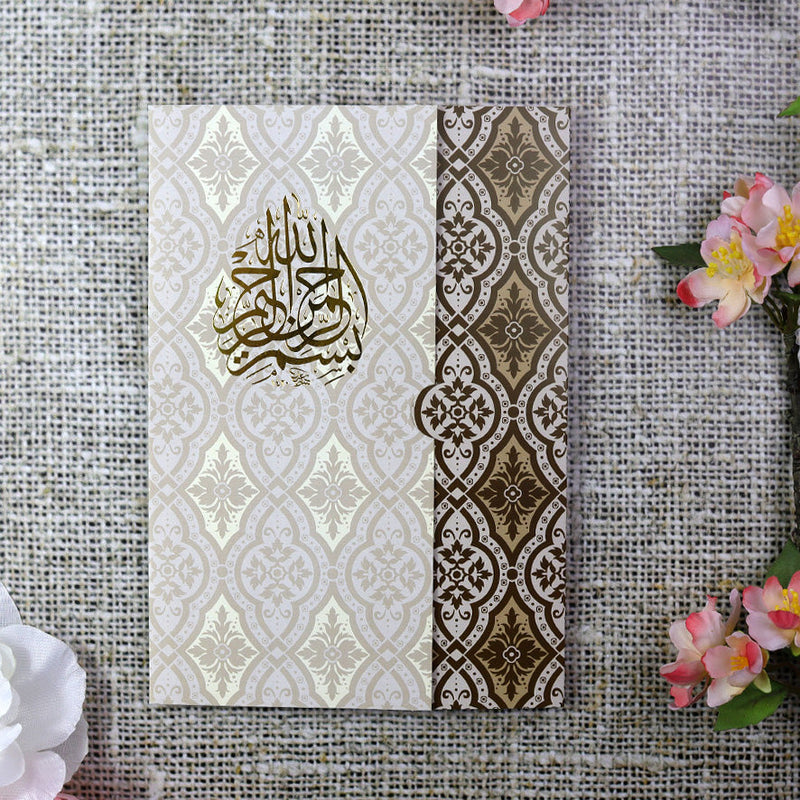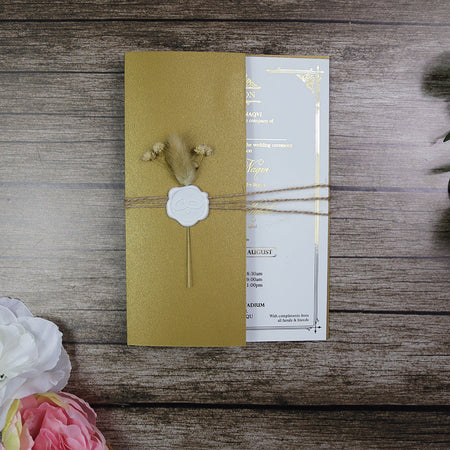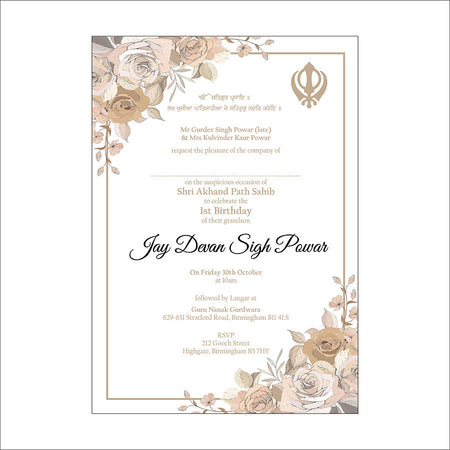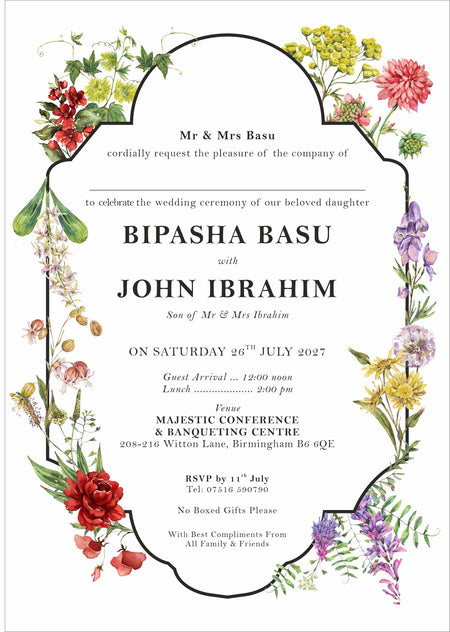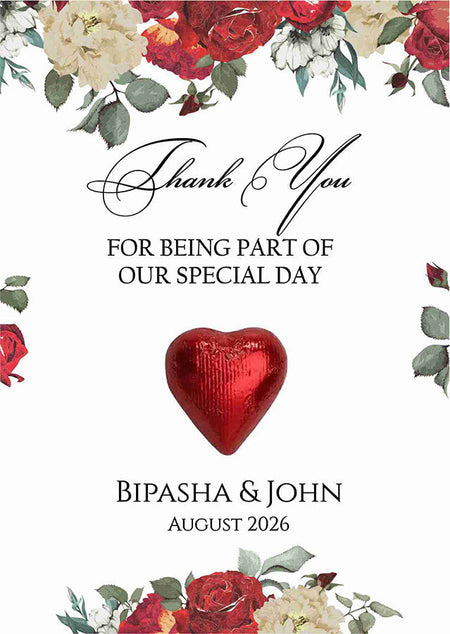Muslim weddings in the UK are vibrant, spiritual, and filled with rich cultural traditions. Whether you're attending your first Nikah (Muslim wedding ceremony) or simply curious about how Islamic weddings unfold in Britain, this guide will walk you through what to expect—from religious customs to modern British-Asian influences.
At ShadiCards.com, we’ve worked with thousands of couples to design beautiful Muslim wedding invitations, giving us a front-row seat to evolving traditions and trends across Pakistani, Bangladeshi, Indian, and Arab communities in the UK.
What Is a Muslim Wedding?
A Muslim wedding is a sacred religious contract between the bride and groom, rooted in Islamic teachings. The ceremony is called a Nikah, and while it is religious in nature, the celebrations surrounding it—like the Mehndi, Walima, and Barat—can vary widely depending on cultural background.
In the UK, Muslim weddings beautifully blend tradition with modern British elements. From elegant venues and tailored wedding attire to sophisticated invitation cards, every detail is thoughtfully curated.
Key Events in a Muslim Wedding
1. Mehndi Night
-
What it is: A colourful pre-wedding celebration where henna is applied to the bride’s hands and feet.
-
Expect: Singing, dancing (especially Dholki and Bollywood-inspired routines), vibrant clothing, and plenty of food. This is often a women-led event.
-
Invitations: Often designed separately as Mehndi invitations, with bright, floral, or paisley themes.
2. Nikah Ceremony
-
What it is: The official Islamic marriage contract conducted by an Imam or religious scholar.
-
Expect: A solemn religious atmosphere. Men and women may be seated separately. The Nikah typically includes:
-
Khutbah (sermon)
-
Ijab-o-Qubool (exchange of consent)
-
Signing of the Nikah Nama (marriage contract)
-
Dua (prayer) for the couple
-
-
Dress code: Modest and formal. Men often wear sherwanis or suits, while women wear abayas, sarees, or lehengas.
-
Venue: Can take place at a mosque, wedding hall, or even at home.
-
Invitations: Typically the main Muslim wedding invitation, often featuring Islamic motifs like crescents, mosques, or Arabic calligraphy.
3. Barat (for Pakistani Weddings)
-
What it is: A grand procession where the groom arrives with his family and is welcomed by the bride’s side.
-
Expect: Fireworks, music, and a regal entrance. This is one of the most glamourous events.
-
Dress code: Ultra-formal. Think heavily embroidered sherwanis, designer lehengas, and jewellery.
-
Stationery Tip: Some couples send out separate Barat invitations to select guests.
4. Walima (Reception)
-
What it is: A celebratory reception hosted by the groom’s family after the Nikah.
-
Expect: Speeches, food, mingling, and a festive but respectful atmosphere.
-
Venue: Often held at wedding banquets or halls.
-
Invitations: Known as Walima cards, often in elegant or minimalist designs with gold/silver foil, reflecting the formal tone.
Cultural Variations in Muslim Weddings in the UK
Muslim weddings in Britain are influenced by a wide variety of ethnic and cultural backgrounds:
● Pakistani Muslim Weddings
-
Events: Mehndi, Nikah, Barat, Walima
-
Style: Rich colours, heavy embroidery, lavish decor
-
Food: Biryani, kebabs, and traditional sweets like gulab jamun
● Bangladeshi Muslim Weddings
-
Events: Gaye Holud (turmeric ceremony), Nikah, Walima
-
Style: Bright yellow, green and red themes, traditional jewellery
-
Music: Traditional Bangla music and contemporary songs
● Indian Muslim Weddings
-
Events: Mayun (bride’s cleansing), Nikah, Reception
-
Style: Blend of Mughal and modern fashion, zardozi work, intricate invitations
● Arab Muslim Weddings
-
Events: Henna night, Nikah, Reception
-
Style: Flowing gowns, abayas, Arabic calligraphy, gold and white décor themes
● Somali, Turkish, and African Muslim Weddings
-
Unique music, dress codes, and traditional dances create a rich cultural tapestry.
Wedding Invitations for Muslim Weddings
At ShadiCards.com, we specialise in creating custom Muslim wedding invitations that reflect both your faith and heritage. Here are some popular trends in 2025:
-
Islamic Calligraphy – Featuring Quranic verses or Bismillah in elegant Arabic script.
-
Foil Embossed Designs – Gold and silver foil stamping on high-quality card for a luxurious look.
-
Minimalist Invitations – Clean designs with modest colours and elegant fonts.
-
QR Code Integration – For RSVP, venue directions, wedding websites and live-stream links.
What Should You Wear?
This depends on the event, but here’s a quick cheat sheet:
| Event | Women | Men |
|---|---|---|
| Mehndi | Bright lehenga/saree/salwar kameez | Kurta or sherwani |
| Nikah | Modest formal dress or abaya | Suit or traditional attire |
| Walima | Evening gown or saree | Formal suit or sherwani |
💡 Tip: When in doubt, ask the couple or refer to the invitation, which may include a dress code.
Etiquette Tips for First-Time Guests
-
Modesty matters: Especially during the Nikah ceremony. Women may need to cover arms, legs, and hair depending on the family's preferences.
-
Be respectful during religious elements: Keep silent during Quran recitation and prayers.
-
Separate seating may be in place: Many Nikah ceremonies have separate arrangements for men and women.
-
Photography rules vary: Some couples request no photos during religious parts or of women—check the invitation or ask discreetly.
-
Gifts: It’s customary to give cash in an envelope, though some couples may have a gift registry or preference listed.
RSVP and QR Codes
Modern Muslim weddings in the UK now commonly use QR codes printed on wedding invitations. Guests can simply scan and RSVP online, view maps, or even submit meal preferences. Over 65% of Muslim couples in 2025 now include QR codes on their invitation stationery for ease and efficiency.
Food and Cuisine
Food plays a major role in Muslim weddings. Expect generous buffets featuring:
-
Curries, biryanis, kebabs
-
Mixed grills and tandoori platters
-
Desserts like ras malai, kheer, and baklava
-
Non-alcoholic mocktails and traditional drinks like Rooh Afza or mango lassi
Alcohol is generally not served at Muslim weddings due to religious guidelines.
How to Address the Couple and Family
-
“Mubarak ho” or “Congratulations” in Urdu/Hindi is warmly received.
-
Address the couple as “bride and groom” or by their names; avoid overly casual remarks about outfits or traditions unless you’re familiar.
-
Respect elders with a polite “Assalamu Alaikum” (peace be upon you) greeting.
Final Thoughts
Attending a Muslim wedding in the UK is a truly enriching experience. You’ll witness the beautiful blend of Islamic faith, cultural heritage, and British influences in everything from the ceremony to the décor and the food.
At ShadiCards.com, we’re honoured to help Muslim couples bring their vision to life with bespoke wedding invitations—tailored for every ceremony, from Mehndi to Walima.
Whether you’re a guest or part of the wedding planning team, knowing what to expect will help you fully enjoy the celebration.
Need Custom Muslim Wedding Invitations?
Explore our full range of Nikah, Mehndi, and Walima invitations on ShadiCards.com – from traditional Arabic calligraphy cards to modern minimalist QR-code designs. Fast UK delivery, personalised service, and premium finishes.

